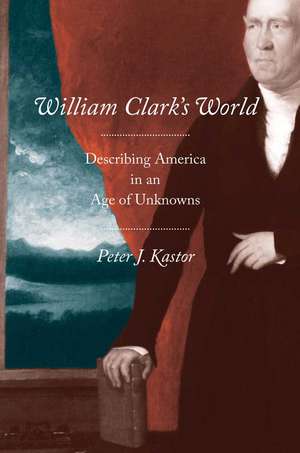William Clark's World: Describing America in an Age of Unknowns: The Lamar Series in Western History
Autor Peter J. Kastoren Limba Engleză Hardback – 22 feb 2011
Din seria The Lamar Series in Western History
-
 Preț: 134.76 lei
Preț: 134.76 lei -
 Preț: 173.18 lei
Preț: 173.18 lei -
 Preț: 135.23 lei
Preț: 135.23 lei -
 Preț: 133.63 lei
Preț: 133.63 lei -
 Preț: 161.73 lei
Preț: 161.73 lei -
 Preț: 217.08 lei
Preț: 217.08 lei - 23%
 Preț: 484.71 lei
Preț: 484.71 lei -
 Preț: 336.33 lei
Preț: 336.33 lei - 23%
 Preț: 508.48 lei
Preț: 508.48 lei -
 Preț: 446.81 lei
Preț: 446.81 lei -
 Preț: 336.12 lei
Preț: 336.12 lei - 23%
 Preț: 447.62 lei
Preț: 447.62 lei -
 Preț: 501.92 lei
Preț: 501.92 lei -
 Preț: 491.88 lei
Preț: 491.88 lei -
 Preț: 346.29 lei
Preț: 346.29 lei -
 Preț: 347.43 lei
Preț: 347.43 lei - 23%
 Preț: 462.87 lei
Preț: 462.87 lei -
 Preț: 415.52 lei
Preț: 415.52 lei -
 Preț: 439.18 lei
Preț: 439.18 lei -
 Preț: 298.47 lei
Preț: 298.47 lei -
 Preț: 403.34 lei
Preț: 403.34 lei -
 Preț: 348.58 lei
Preț: 348.58 lei -
 Preț: 304.23 lei
Preț: 304.23 lei -
 Preț: 399.65 lei
Preț: 399.65 lei -
 Preț: 381.36 lei
Preț: 381.36 lei - 23%
 Preț: 434.16 lei
Preț: 434.16 lei - 19%
 Preț: 139.97 lei
Preț: 139.97 lei - 19%
 Preț: 139.97 lei
Preț: 139.97 lei - 16%
 Preț: 179.47 lei
Preț: 179.47 lei - 16%
 Preț: 164.41 lei
Preț: 164.41 lei - 20%
 Preț: 153.94 lei
Preț: 153.94 lei - 15%
 Preț: 249.11 lei
Preț: 249.11 lei -
 Preț: 233.67 lei
Preț: 233.67 lei -
 Preț: 181.63 lei
Preț: 181.63 lei
Preț: 567.36 lei
Preț vechi: 736.83 lei
-23% Nou
Puncte Express: 851
Preț estimativ în valută:
108.56€ • 113.65$ • 89.83£
108.56€ • 113.65$ • 89.83£
Carte tipărită la comandă
Livrare economică 07-21 aprilie
Preluare comenzi: 021 569.72.76
Specificații
ISBN-13: 9780300139013
ISBN-10: 0300139012
Pagini: 360
Ilustrații: 41 b-w illus.
Dimensiuni: 156 x 235 x 25 mm
Greutate: 0.72 kg
Editura: Yale University Press
Colecția Yale University Press
Seria The Lamar Series in Western History
ISBN-10: 0300139012
Pagini: 360
Ilustrații: 41 b-w illus.
Dimensiuni: 156 x 235 x 25 mm
Greutate: 0.72 kg
Editura: Yale University Press
Colecția Yale University Press
Seria The Lamar Series in Western History
Notă biografică
Peter J. Kastor is associate professor of history and American culture studies, Washington University in St. Louis. He is the author of The Nation’s Crucible: The Louisiana Purchase and the Creation of America, published by Yale University Press. He lives in St. Louis, MO.
Recenzii
“Professor Peter Kastor has written an engaging, interesting, and important monograph tackling a big question: 'How do you describe a continent?' The author is convincing in his narrative, offers new insights, and has written it in engaging prose that is both illuminating to the specialist and accessible to the general audience."—Jay Buckley, Author of William Clark: Indian Diplomat
"In this book, William Clark and other explorers are less brave adventurers in an unbroken tradition of expansion than imperial agents whose representations of North America tell us as much about them and the limits of their world as they do about the continent they professed to master. Kastor's analysis of official reports, journals and maps is fascinating, as are his accounts of their publication and reception.”—Andrew Cayton, Miami University
“Drawing on a rich array of sources including maps, letters, paintings, and public documents, this book sheds new light on the production of the American West and creatively recovers a crucial aspect of American territoriality as it emerged on the nation’s frontier rather than at its center. Kastor explains to great effect the shift in popular attitude towards expansionism, which, while rejected in the 1780s, was embraced with unbridled boosterism in the 1830s.”—Martin Brückner, Author of The Geographic Revolution in Early America
“Long before paintings, photographs and films depicted the West as a place of national romance, maps offered the best visual record of this little known place. By paying close attention to the maps produced by William Clark and his contemporaries, Peter Kastor instructs us in how to read maps as rich cultural and political texts, and offers a fresh new way to understand the place of the West in American life during the early republic.”—Martha A. Sandweiss, author of Print the Legend: Photography and the American West
". . . admirably alert to geographical complexity as well as historical contingency."—Konstantin Dierks, Huntington Library Quarterly
"For both scholars and general readers, William Clark's World is essential reading not only for an illumination of exploration, surveying, and mapping the American West during the nation's early years but also for understanding the origins of Manifest Destiny" — John H. Monnet, Metropolitan State College of Denver
